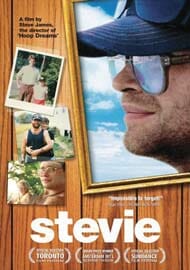Steve James on Stevie

It’s been a fantastic year for documentaries. Box office dollars and critical kudos have piled up for movies such as Bowling for Columbine, Spellbound and Capturing the Friedmans. With the incendiary The Revolution Will Not Be Televised and Errol Morris’s masterpiece The Fog of War set for release later this year, many critics’ “top 10” lists could be dominated by non-fiction films. Yet one of the best documentaries of 2003 has been largely overlooked in the commotion. Stevie, directed by Steve James (who also directed the landmark Hoop Dreams), is a brilliant portrait of people most audiences usually ignore.
Steve James started off as a journalism major in college but got turned on to making movies in a film appreciation class. But you could argue that he hasn’t left journalism too far behind.
“The kind of documentaries I’ve always been interested in making are stories, not issue-oriented but more journalistic enterprises,” James explains as we sit at his home in Oak Park, Illinois. “I think there’s something really compelling about following a story, where you don’t know where it’s going.”
Stevie is a perfect example. During his college years, James was a Big Brother to an 11-year-old boy named Stevie but lost touch after he moved to Chicago. When James moved back to southern Illinois 15 years later, he wanted to reconnect with his former “little brother.” He planned to make a “modest” documentary about their reunion, envisioning “an impressionistic portrait about getting back together.” That all changed with a dramatic turn of events in Stevie’s life. He was arrested for molesting his eight-year-old cousin, and the real story began.
“That’s what’s compelling about this kind of film,” James says. “If you, as a director, remain flexible to where the story takes the film, that’s going to yield a much more interesting movie.”
Being flexible proved critical as Stevie’s circumstances changed over the next few years. Though his legal troubles certainly provide a timeline for the movie, the film focuses much more on Stevie’s home life: his relationship with his girlfriend Tonya, his efforts to reconnect with his mother, and his half sister’s attempts to have a baby.
James paints intimate portraits of each person in Stevie’s life. Telling the story of these real-life characters without being exploitive proved challenging.
“The ethical issues are the hardest part about doing this kind of film,” he says. “The thrill and excitement of following a story, about being involved in people’s lives is undeniable. You feel like you’re living in someone else’s life, someone else’s experience. But you also feel like a leech. With Stevie, those concerns about exploitation were so acute that they had to be part of the story.”
So James himself becoming a primary figure in his own film. The documentary shows James trying to get Stevie to do the right thing and trying to bridge the enormous barriers that divide his family. Through it all, we see James wondering not only what’s best for Stevie but whether his own presence is helping or hurting.
-

-

-

-

-

-

-

-

-

-

-

-

-

-

-

-

-

-

-

-

-

-

-

-

-

-

-

-

-

-

-

-

-

-

-

-

-

-

-

-








































